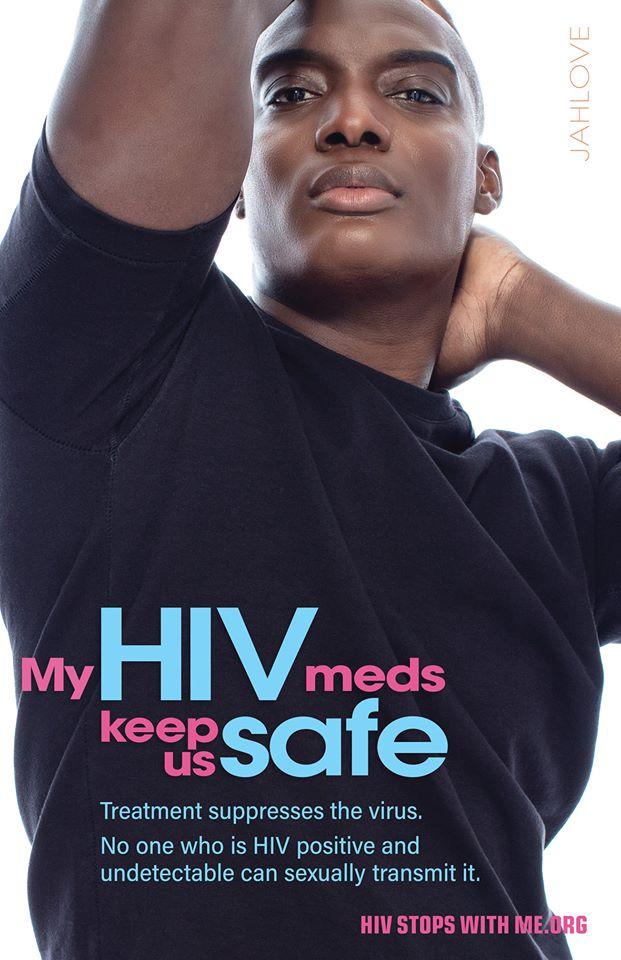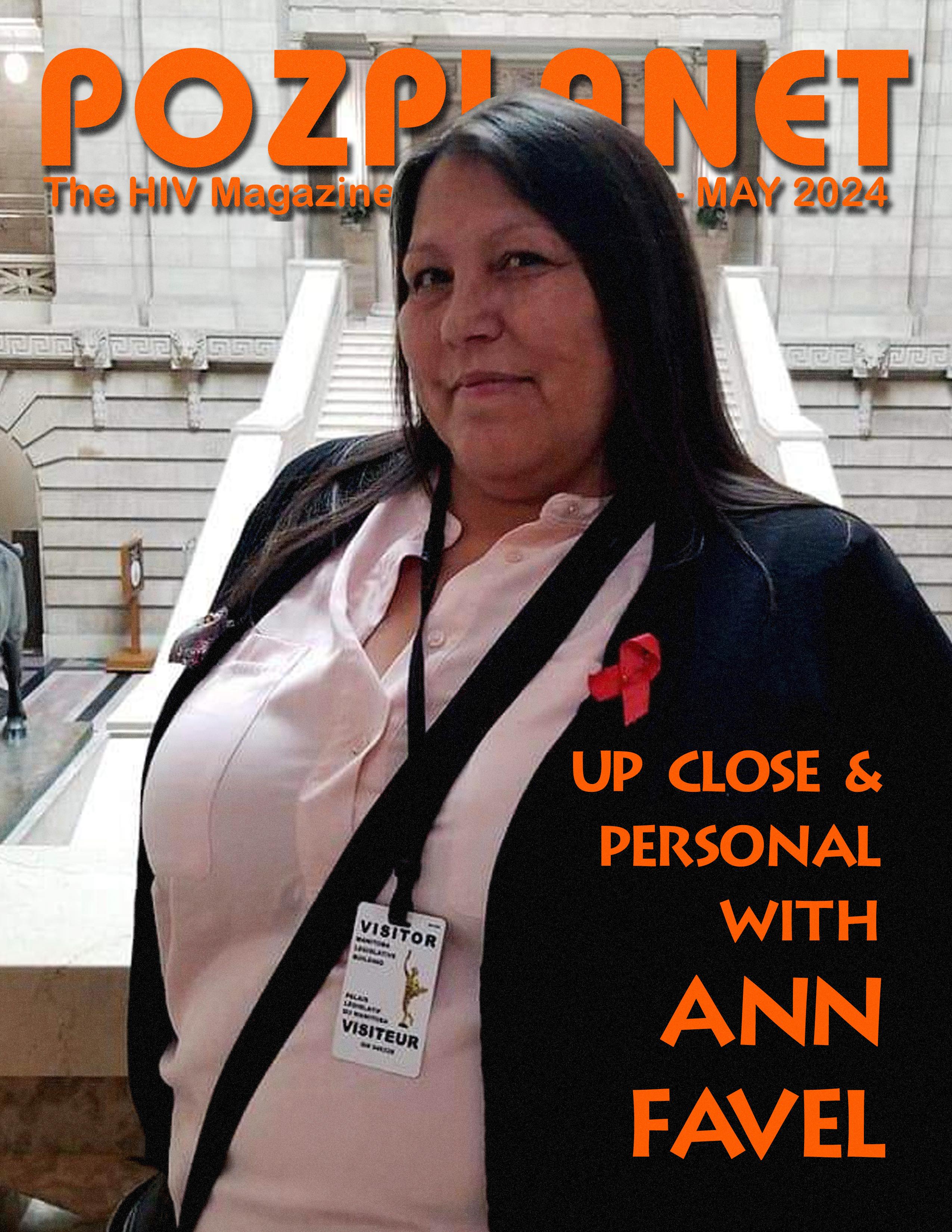

“Gay British-Mexican Man Jailed In Qatar In a Grindr Sting – Pressured To Give Names of Sexual Partners Plus Denied HIV Meds”
Original post: https://omg.blog/omg-gay-british-mexican-man-jailed-in-qatar-for-using-grindrpressured-to-give-names-of-sexual-partners-denied-hivmeds/?fbclid=IwZXh0bgNhZW0CMTAAAR1Cidv6sAzndOpdrrsyBROX6xqR9rS_mq6PsL5JBG5PTuQPFx 5u6YuUZSA_aem_AZMyOrtrpfrbBKKSd5owi0ByglBTLPfxjbPa_HXJJb3ytd5S4lrg4qlEjmZUuFJ7i1MRz1_td8FyxyUhMMlcK4u
A dual British-Mexican citizen arrested in Qatar has been pressured to reveal names of men he’s had sex with as a condition of his release from jail. Manuel Guerrero fell victim to a police-led Grindr sting and was later denied his HIV meds. He is out of prison but now can’t leave Qatar. He still hasn’t named anyone he slept with.
This world we live in… People need to chill the fuck out. Periodt. So much unnecessary hatred and anger. More on the full story after the jump and check out QatarFreeManuel for updates on how you can help! Link: https://twitter.com/QatarFreeManuel
Gay sex in the conservative Muslim country is punishable by up to seven years in prison, and carries the death penalty under Sharia law, although this is unenforced.
The ex-British Airways manager, who is HIV positive, is now out of prison but faces prosecution, according to his brother. He is banned from leaving the country and is about to run out of antiretroviral medication.
“We need the support and solidarity of the LGBT community”
–
Manuel’s brother, Enrique
Speaking to Attitude last week, Enrique Guerrero Aviña said: “Manuel was released, but the investigation continues. He has a travel ban. The medical situation is not solved. At this moment, Manuel is taking his own antiretroviral, but we only have nine days’ more of the doses.”
“He is very affected by the torture, the post-traumatic stress, but he has hope that with the solidarity of the LGBTQ community and organisations worldwide, and everything we are doing, that we can reach freedom and justice,” added Enrique. “But he’s worried about his health, and access to medicine.”
Enrique points out that “suspending and then taking the antiretroviral is very dangerous, as that can generate resistance to the medicine.”
Enrique alleges that, while in prison, Manuel’s HIV medication was withheld “to create psychological pressure.”
“He is very affected by the torture, the post-traumatic stress, but he has hope that with the solidarity of the LGBTQ community and organisations worldwide, and everything we are doing, that we can reach freedom and justice,” added Enrique. “But he’s worried about his health, and access to medicine.”
Enrique points out that “suspending and then taking the antiretroviral is very dangerous, as that can generate resistance to the medicine.”
Enrique alleges that, while in prison, Manuel’s HIV medication was withheld “to create psychological pressure.”
“They made an intervention to know the names of Manuel’s sexual partners,” he added, later qualifying that Manuel did not give over names. “That was before the release. That act of torture was documented by the UK embassy. It’s like the trial of another century.”
“The prosecutor could take him to a trial,” Enrique furthermore explained, adding his brother “needs to be
repatriated. The UK government can do it, but we need the decision to be made.
“We need the support and solidarity of the LGBT community and the British citizens to make more pressure. The UK government can make more effort to save the life of Manuel and to bring him home. He’s a British citizen.
“The UK government know about the case, the situation, and that Manuel does not have access to a fair trial. Manuel was 38 days without a lawyer and without a translator. Until this day, the lawyer doesn’t have access to the files. That’s not fair.”
“Like a trial of another century” Enrique, now leading the QatarFreeManuel campaign, also claims drugs were planted on his brother during the arrest.
“The Qatari government thinks HIV is a criminal network,” Enrique says. “They want to know the names of sexual partners to go for them. It’s terrible.”
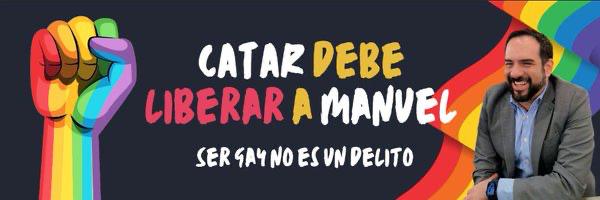
WATCH THESE INTERVIEWS: https://x.com/ElFinanciero_Mx/status/1782930406976741840
https://www.youtube.com/watch?v=hK4QE8UP3gQ
https://x.com/ImagenTVMex/status/1782832322473038242
https://x.com/TheMexLondoner/status/1782759226781110641
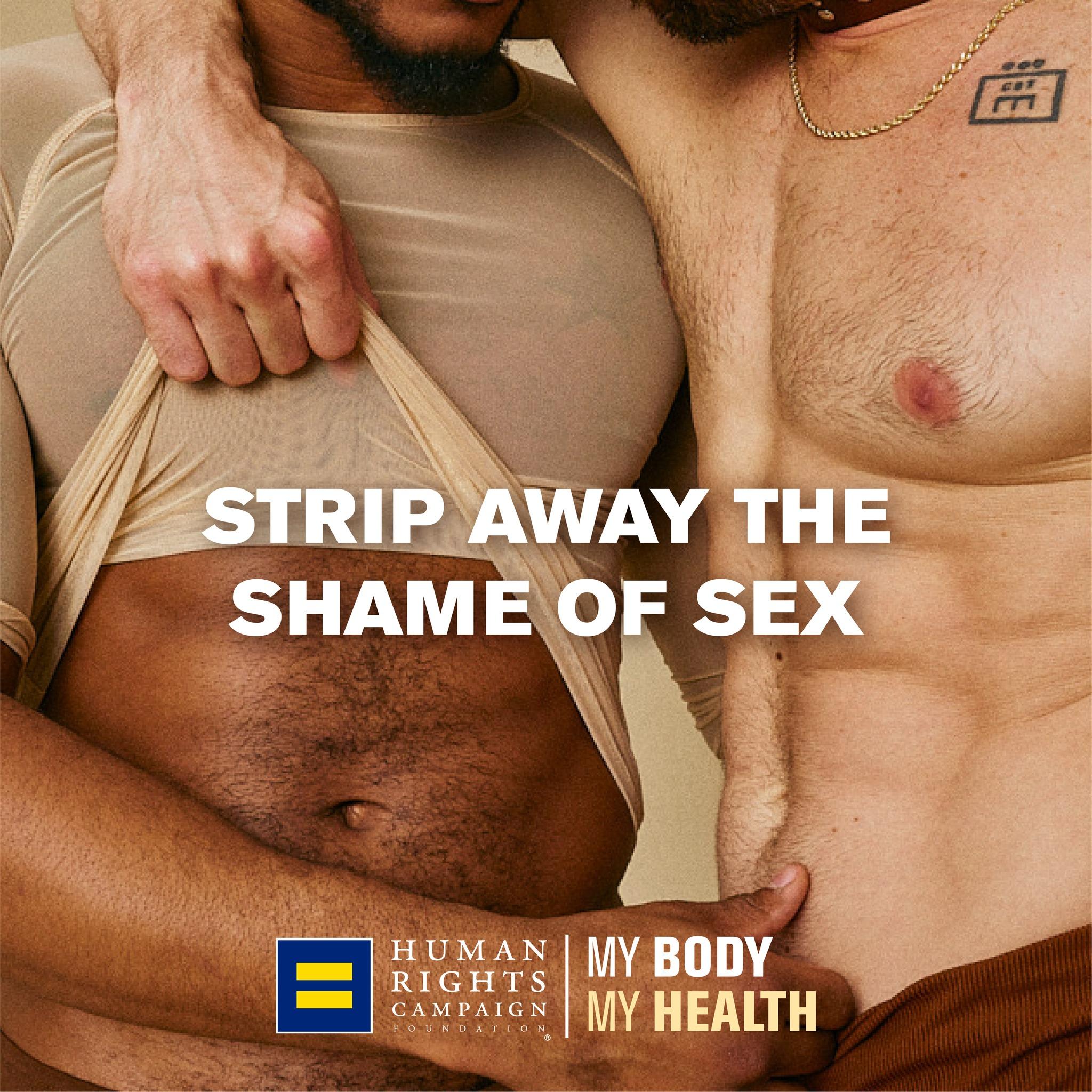
We are sexual beings and should not be ashamed of that. Harness your pride, your sexuality and take control of your sexual health to help build a generation free of HIV and stigma. Get tested. Know your status . Get PrEP or the meds you need to be healthy. More info here: https://mybodymyhealth.org/sex-positivity
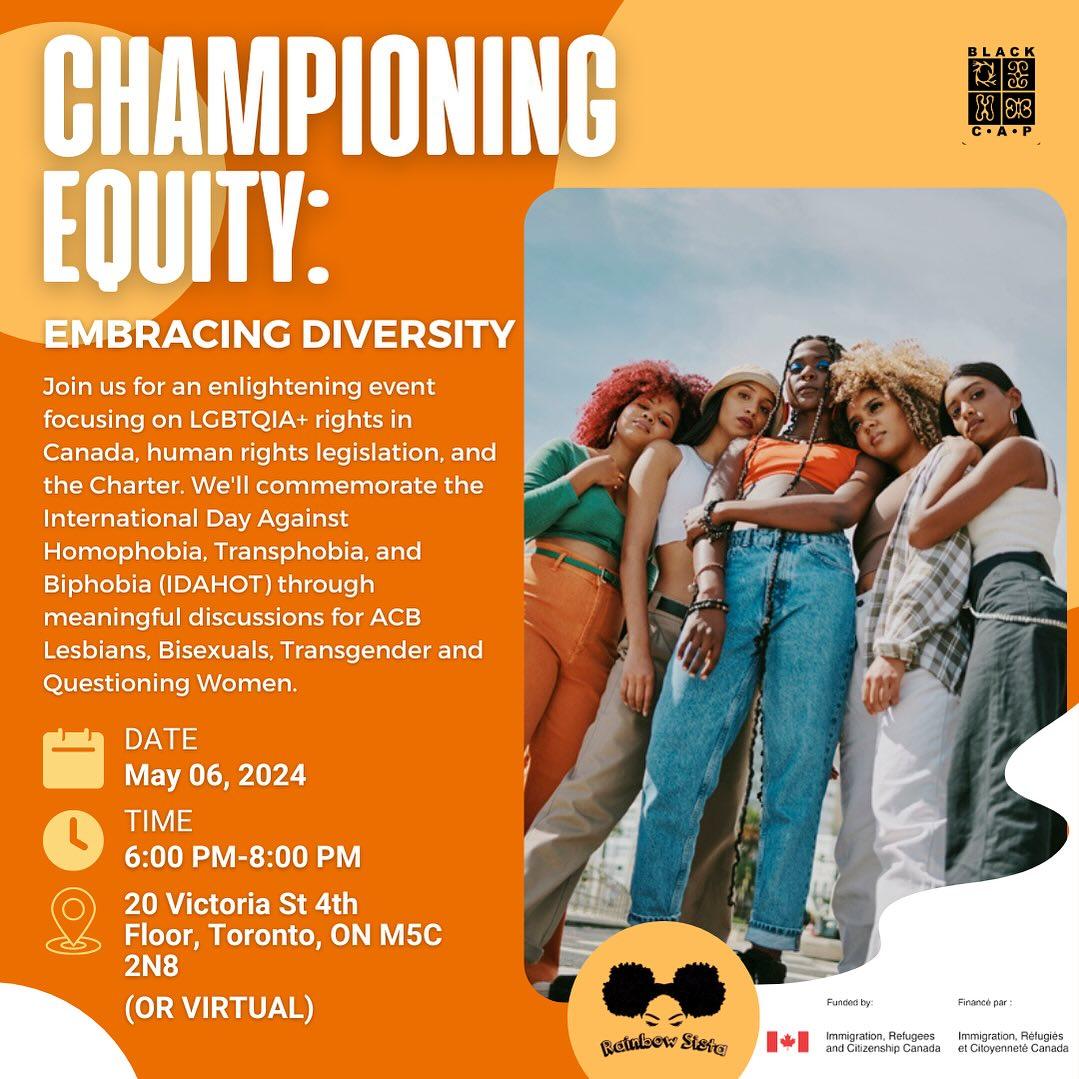
Championing Equity: Embracing Diversity by The Rainbow Sistas (African, Caribbean, and Black 2SLGBTQ+ Women)
Date : May 6th, 2024 Location : 20 Victoria St, Toronto, ON or Virtual Zoom
Time : 6:00 PM - 8:00 PM / Light Refreshments and Presto will be provided.
We’re excited to have you join us for an evening of community, reconnections, and shared experiences Please make sure to provide accurate contact information so that we can keep you updated with event details and any important information. We look forward to spending an insightful evening with you!

A conversation between Dr. Theresa Tam and Jade Elektra
https://blog.catie.ca/2024/02/29/a- conversation-between- dr-theresa-tam-and-jadeelektra/?fbclid=IwAR1VAbMRpdraJ1ViPBe0YW0_6Heymgpv_OxVLDOKLD2Jqwbi23f2YRCSKY
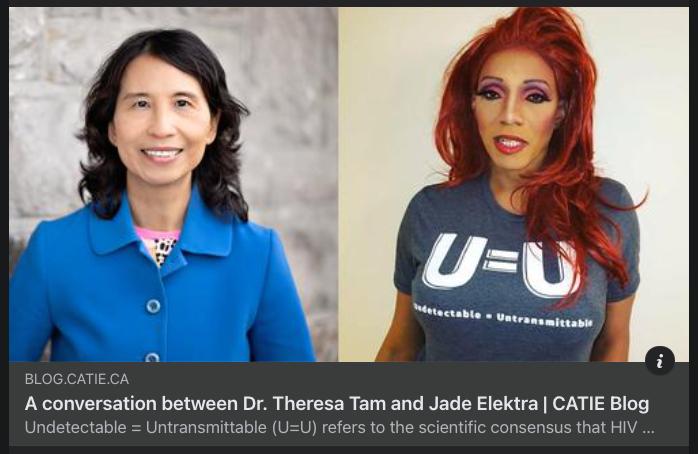
Undetectable = Untransmittable (U=U) refers to the scientific consensus that HIV cannot be sexually transmitted when a person living with HIV consistently takes antiretroviral therapy (ART) and the amount of HIV in their blood remains very low so low that it cannot be detected by many standard HIV tests.
While the U=U message empowers people living with HIV and reduces stigma associated with the virus, it is only effective if individuals living with HIV are able to continuously take their medication. Some people in Canada, such as African, Caribbean and Black communities, Indigenous people, gay, bisexual, and other men who have sex with men, people who use drugs and incarcerated people, face social and structural barriers that can impact
access to HIV care and make it difficult to maintain consistent access to treatment. In order for U=U to have the greatest impact, people living with HIV must be supported by promoting U=U, advocating for those who face barriers in medication adherence and facilitating access to care. All public health and health professionals can help normalize and share the U=U message.
Dr. Theresa Tam, Canada’s chief public health officer, had a discussion with Jade Elektra, HIV activist, drag performer, recording artist and community builder about the social and structural nuances of U=U.
Dr. Theresa Tam: Jade, it’s a pleasure speaking with you about U=U. You’ve done so much to create safe spaces and address HIV-related stigma. The magazine you’ve founded by and for people living with HIV is just one example. I’m looking forward to delving into this topic with you.
Jade Elektra: Thank you, Dr. Tam. I’m always happy to talk about U=U—it’s a topic close to my heart and one that needs more attention. U=U can have a tremendous impact on a person living with HIV, especially if they are sexually active, and can be empowering for young people and recently diagnosed folks living with HIV. However, I’d be interested in hearing your perspective as a public health leader on why U=U is so important.
Dr. Theresa Tam: Looking back, it’s amazing to see how far treatment and care for HIV has come in the past 45 years. Thanks to scientific advances, HIV has become a treatable chronic condition. Don’t get me wrong, we still have a ways to go, but now people with HIV are living longer and healthier lives than before. People living with HIV who are aware of U=U are more likely to report better mental, physical and sexual health. This science has transformed what it means to live and love with HIV on a global scale. However, we also need to address the stigma and discrimination experienced by people living with HIV, both socially and within healthcare settings. It can really affect people’s well-being, including their willingness to seek out testing and treatment.
Jade Elektra: Yes, there are many barriers that could contribute to not achieving an undetectable status.
Dr. Theresa Tam: In 2020, close to 17,000 people in Canada did not achieve viral suppression. Because they lacked access to effective HIV treatment options or didn’t take any treatments, they were still at risk of transmitting HIV. The U=U message is important because it reduces HIV-associated stigma and encourages people to access testing and treatment needed to reach an undetectable status. As much as there is still work to be done, Canada has made great strides and has already reached one of the
UNAIDS interim HIV treatment targets for the year 2025 of ensuring 95% of people with HIV who are on treatment have a suppressed viral load. We know that there are barriers to becoming undetectable. Jade, could you share your views on what might prevent someone from achieving “undetectable” status?
Jade Elektra: Yes, there are many possible contributing barriers such as lack of education, racism and limited access to healthcare facilities. African, Caribbean and Black communities in particular experience higher rates of HIV, but these communities may also face more systemic and structural barriers preventing access to medication. Some people may have to choose between buying food, paying rent or getting their medication. Other folks may experience intermittent access to treatment, multiple health problems at once or precarious housing without a set routine. Any of these situations affects their ability to stick to a treatment plan. What’s more, people may be reluctant to continue seeking care if they experience racism in healthcare settings or cannot access culturally appropriate care. But I believe the stigma of being HIV-positive, or even being perceived as being HIV-positive, is the biggest hurdle.
Dr. Theresa Tam: Clearly there are complex and compounding systemic factors that may impact someone’s ability to consistently take medication or access testing and care to begin with.
Jade Elektra: Definitely. I went many years without any medical treatment and was extremely ashamed and felt afraid to let anyone know that I was HIVpositive. I believe that shame and fear actually made my health worse. But once I started antiretroviral meds and started watching my numbers [my CD4 count] get better I took pride in taking care of myself.
That said, not everyone who is living with HIV has access to medical treatment or an adherence routine due to the factors we’ve been talking about. The shame and fear these individuals may feel might be reinforced by general HIV-related stigma, not being able to reach viral suppression, or even specific healthcare-related stigma. They may face discrimination and judgment by health professionals for not adhering to treatment or not getting support in leading full social and sexual lives. They may even be labelled as “non-compliant” in adhering to medication, which adds to the stigma, when in fact the barriers these individuals face are systemic and not a reflection of a personal failing.
Dr. Theresa Tam: For patients who face barriers to U=U, it is important for us, as health professionals, to recognize our own personal biases and avoid stigmatizing patients that aren’t adhering to medication. As health
professionals, it is important we take a person-centered approach and provide support that meets patients’ needs.
Jade Elektra: I feel strongly that health professionals need to support patients living with HIV, especially those who face barriers to U=U. U=U should be a practiced, normalized conversation with patients and clients, and awareness of barriers should be well known. I have experienced healthcare settings where the provider is not promoting U=U or doesn’t know about it. What would you recommend health professionals do to support patients with HIV who face barriers to U=U?
Dr. Theresa Tam: Not just as health professionals, we need to normalize sexual health and sexual health conversations, including talking about sexually transmitted and blood-borne infections, to reduce stigma associated with HIV testing and treatment.
We can continue to support patients who face barriers to U=U by promoting the full range of effective, evidence-based prevention options for HIV and other sexually transmitted and blood-borne infections, like condoms, preexposure prophylaxis (PrEP), post-exposure prophylaxis (PEP) and harm reduction. We can connect patients with other health or social services, which may then help address the barriers our patients face to reaching undetectable. How do we encourage health professionals to champion U=U while also meeting patients where they are at?
Jade Elektra: I believe a bigger push to educate all health professionals, people living with HIV and the general public at large about U=U could help close the gap. Pamphlets in waiting rooms and clinics and displaying posters in public areas is a great way to start the conversation. Now we can add the Public Health Agency of Canada’s recent public awareness campaign on U=U and its helpful resources such as the Communication Tips for Health Professionals factsheet. Another good source of information is CATIE, a community-based organization promoting good practices for prevention and treatment that also has great HIV and U=U related materials available, free of charge. We need the information widely available in the public sphere. Encouraging patients to ask questions is another great way to start the conversation and meet people where they are at. Health professionals can ask patients about their situation and the barriers they may face to learn how to best support their health needs. Always remember that each person has their own circumstances of why they can or cannot achieve an undetectable status. It’s helpful to focus on what can be done to support patients within their unique circumstances.
Dr. Theresa Tam: Thank you, Jade, for taking the time to speak about U=U and openly sharing your thoughts and experiences. Our conversation today
emphasizes that all health professionals, whether or not they work in sexual health or HIV-specific fields, have the power to create positive change through initiating and promoting conversations about HIV, U=U and safer sex.
To learn more about U=U and to access resources for health professionals, please visit Canada.ca/HIV.
Dr. Theresa Tam was named Canada’s chief public health officer in June 2017. As the federal government’s lead public health professional, she provides guidance to help protect the people of Canada against health threats, advance health equity and promote healthier communities, using the best available data and evidence. For her full bio, click here.
Jade Elektra (born Alphonso King Jr.) is a Black queer HIV activist, drag queen, singer, recording artist (DJ Relentless) and stage performer from Tampa, Florida, now based in Toronto, Ontario. Jade is openly living with HIV and through activism and outreach, has strived to make a positive impact for HIVpositive and queer people of colour, as well as LGBTQ communities in Toronto and around the world. Jade is a founder of POZPLANET and POZ-TO, which fight HIV/AIDS stigma by hosting social events, as well as partnering with and fundraising for community-based HIV/AIDS organizations.
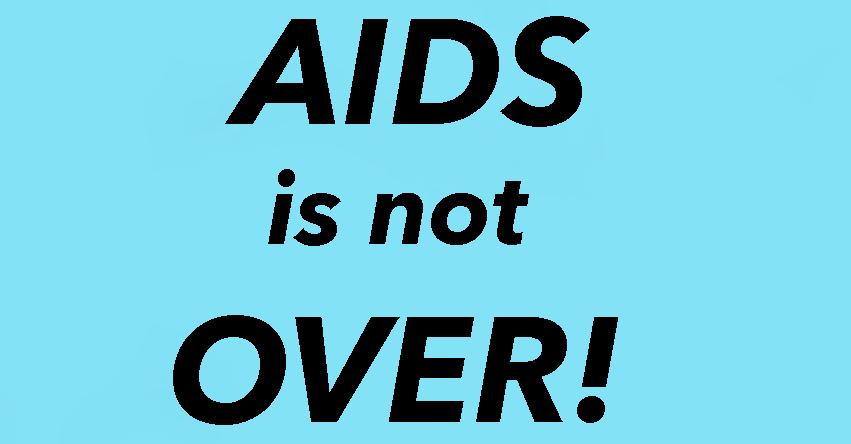

Find out more informa.on here: h1ps://www.hiv.gov/federal-response/ending-the-hiv-epidemic/overview

We are bringing back the Anxiety & Mindfulness group in a new format. It will be held virtually for 4 sessions 12.30 pm-2 pm on Tuesdays starting May 14. It will mix different teachings from CBT, DBT, and mindfulness practice to give folks a toolbox to deal with their anxiety and stress. Please reach out to msinno@actoronto.ca for registration and questions! If you’re having troubles this could help.
WHAT’S HAPPENING IN OTHER PLACES
A report from our correspondent inside the story, Greta Lakes
Editors Note: Every now then I get messages from people looking for help. I try to explain that I am an immigrant in Canada and have no financial or political power. But what I can do is share their stories in their own words. I doubt that Greta Lakes is really this person’s name. Most likely it is not safe for them to share their real name since their life would be in danger. But I received this information in a message sent to my Jade Elektra facebook profile. The account name is Greta Lake Queers. I asked if Greta was a writer, and this is what they sent me:

Kakuma Refugee Camp is located in the North-western region of Kenya. The camp was established in 1992 following the arrival of the “Lost Boys of South Sudan”. During that year, large groups of Ethiopian refugees fled their country following the fall of the Ethiopian government. Somalia had also experienced high insecurity and civil strife causing people to flee. In 2016, UNHCR and the National and County Governments established the Kalobeyei integrated settlement to decongest the Kakuma refugee camp and promote socio-economic integration with the host community. Influxes over the years have been driven by conflict, persecution, food insecurity but also the consequences of climate change (drought and floods). Socio-economic integration became so hard for the Queer community because of our sexual orientation and identities.
As LGBTI individuals in Kakuma camp, we have suffered physical and sexual violence and other serious human rights abuses, including violations of our rights to be free from torture and ill-treatment, because of our sexual orientation, gender identities and/or expressions, or sexual characteristics. As LGBTI asylum seekers, we are suffering from discrimination as well as homophobic and transphobic attitudes from government officials, the police and other service providers. This is often reflected in delays to the processing of our asylum claims, harassment, violent homophobic attacks, threats, and intimidation, and extremely limited opportunities for local integration or third-country resettlement.
Most of the lesbians have suffered from rape experiences and they end up diagnosed with pregnancies and HIV+. Doctors in Camp hospitals are discriminative in lendering their services to us. we have lost our loved ones likes of Trindad, johny, Rebecca among others who were attacked and burnt. But because of doctors' negligence, these guys lost their lives in pain. Where we can only get better treatment is in private hospitals but we are challenged with lack of enough financial support.
Inaccessibility to employment opportunities. This was done deliberately by the government of kenya. They have failed to grant us refugee statuses thereby limiting us from accessing opportunities to job markets. When we decide to start up informal sectors, we are attacked by host community and straight refugees. Verbal assaults are like assaults.
The 2021 refugee act, gave the Kenyan government a lot power over refugees and asylum seekers leaving UNHCR with a very little over us. We have had many meetings with two parties (unhcr & Kenyan government) but nothing positive has come our way.
Kenyan government always empty promise us and if we remind them about the promises they made, they do threaten us.
Jade we have endured a lot that you can not even imagine, we lack food to eat, medication supplies among other basic necessities.
In case of any help you can reach out to us through:
https://www.justgiving.com/crowdfunding/queer-kakuma
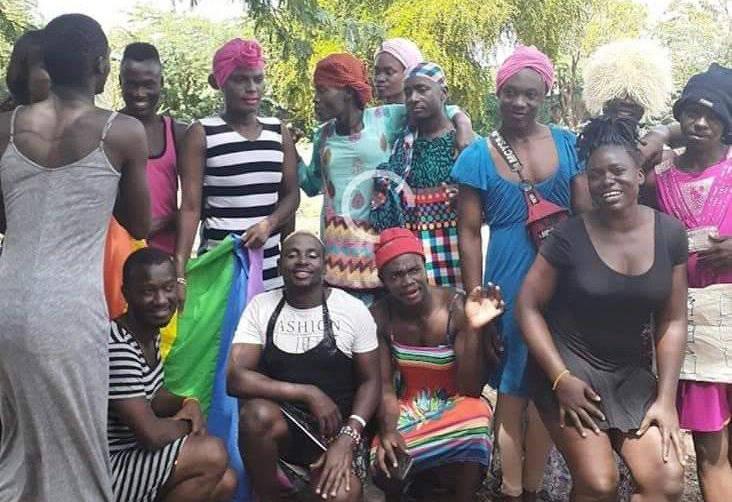

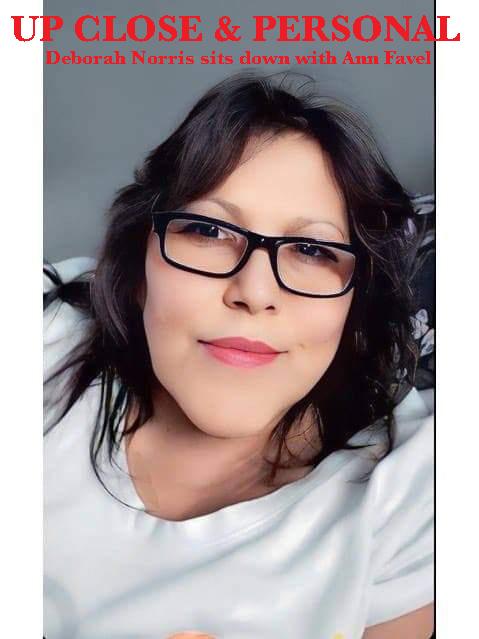
EDITOR’S NOTE: For a while now I, Alphonso King Jr have been trying to get more female stories shared in this column. I’m not sure if it is the fact that I am a man asking personal informa@on or if it has to do with the male dominated coverage in most LGBT magazines and media, but I decided to turn the reigns over to POZPLANET’s Deborah Norris and she will be our correspondent for most of our women’s interviews and ar@cles. Representa@on is very important and sharing our stories is even more important.
DN: Hello Ann! Thank you for doing this interview. Can you tell me a bit about yourself? Where do you live?
AF: My name is Ann Favel and I am a Cree Woman from Peguis First Na@on in Manitoba. I have lived in Winnipeg most of my life along with many other ci@es throughout Canada.
DN: When were you diagnosed? What was it like for you then?
AF: I was residing in ORawa when I was diagnosed with HIV in 2008. The day I got my results back I was floored as I didn’t even know that I was geXng tested for HIV. I was in ORawa Correc@ons Deten@on Centre (OCDC) at the @me. A guard came and got me from my cell that I was locked up in 23 hours a day and put me into a smaller holding cell for like 2 hours. When she finally came and opened up the holding cell door, she came and handed me a piece of paper that had liRle to no informa@on about HIV and told me that I tested posi@ve for HIV. Then she took me back to my cell. I was devastated as I knew nothing about HIV. My oh my, my head was spinning. All I’ve ever been told about HIV was that it turned into AIDS and that it was a death sentence. They booked an appointment for me to see an HIV specialist. They took me to the hospital shackled and handcuffed. I had to sit in the wai@ng room like that. I felt dirty, ashamed and inhuman; they were dehumanizing me. To top it off my rights to disclose were taken away from me in a heartbeat as they placed Ensure on my diet. So, everyone in that jail knew that I was living with HIV. Now everyone on the streets also knew. With being newly diagnosed I got heavier into drugs and didn’t really care anymore about if I died or lived as I was going to die anyways, so why not die high? In 2010 I ended up in jail again and this @me got out through ORawa Drug Treatment Court (ODTC). My case manager Rudy made me feel like I was a person again and helped me love myself again. I was able to live with myself and my HIV. I was taking my medica@on of Complera regularly. I have now lived with HIV for 16 years. Although I don’t like taking medica@on, I am now taking Biktarvy daily. I started taking this medica@on ader my 6 week treatment to be cured of Hepa@@s C while I was living in Edmonton.
DN: When did you decide to disclose your status publicly?
AF: I didn’t really get into dealing with my HIV un@l I moved back home to my family in 2011. They were the only ones that maRered to me on who I needed to disclose to. Man was I shiXng bricks. They s@ll love me even though I am HIV posi@ve. Man that took a lot of courage telling them on the first day that I was back into their lives ader 13 years of being away from them and them not knowing a single thing about what I was doing within those 13 years. I ended up staying with my sister that I live with now for about 9 months before I moved to Edmonton to live with my other sister and her family. This is where I was told about HIV Edmonton by my doctor. It took me about a year before I could muster up the courage to walk through their doors. I felt that if anyone that was going by seen me going into that
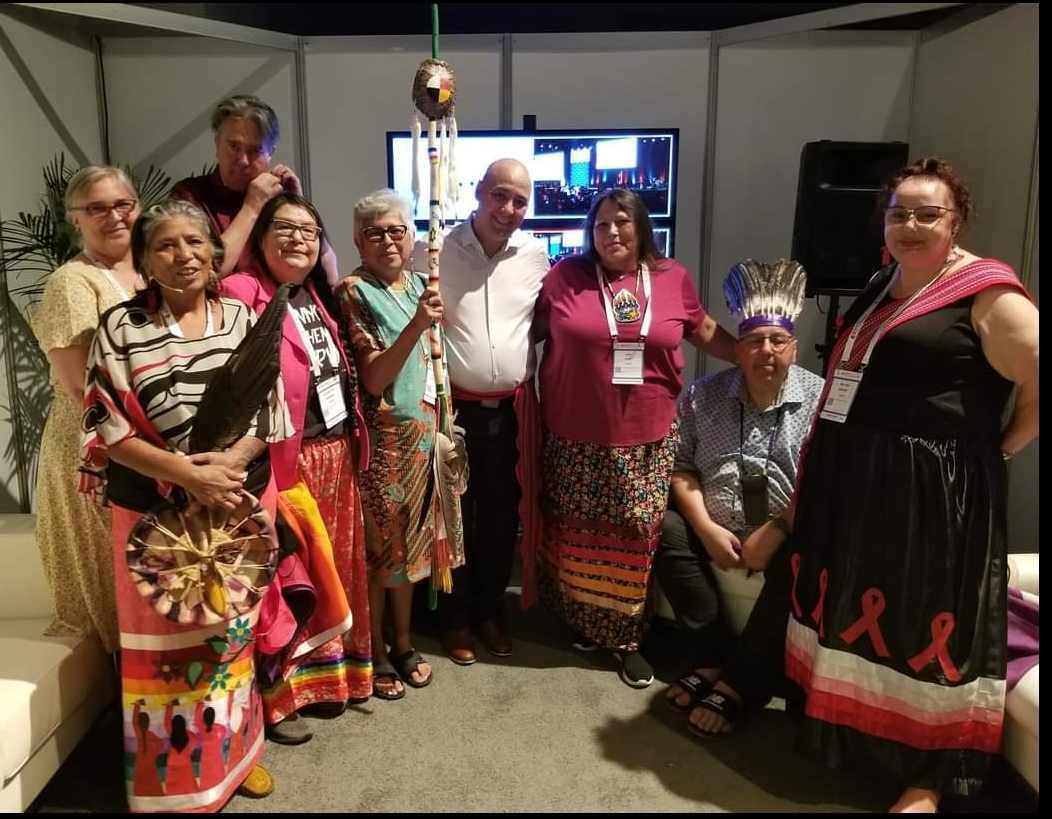
building would know that I had HIV and would look down on me. And my life would be ruined once again. Mind you when I did make it through them doors, I think that was the best thing that I have ever done in my life other than a>ending ODTC. The people that worked at HIV Edmonton were the most beauEful amazing people I have ever met. They showed me so much love that it didn’t even ma>er to them that I was posiEve. They seen that I had a voice so they asked me to use it by talking to student nurses and to go to Indigenous communiEes to tell my story. HIV Edmonton offered me the chance to take a media training in order to build my capacity to speak about people who were living with HIV, HepaEEs C, street involved people, people who are unhoused, people who use drugs, people in the sex trade and people who had been incarcerated. It allowed me to learn how to soJen my story to talk to Indigenous youth. I did a talk to a Northern Alberta community of youth. HIV Edmonton also got me on the radio and TV. I was one of the speakers on their HIV Walk. I was able to embrace my status of HIV and not be ashamed that I live with that.

I think I’ll tell you a liRle story about disclosure. I didn’t have the sa@sfac@on to disclose on my own because of that jail that I was in and them puXng that drink on my tray and everyone who saw it knowing now that I was HIV posi@ve. I did have the luxury of telling one of my friends that I used with. He was known as Chief to me while I was on the Streets of ORawa. I remember I was really dope sick and couldn’t wait to get my pill into me. So, I walked to the nearest park and while I was walking there I could hear a chant. Like someone was actually singing a song from my ancestors. As I came closer I no@ce that it was Chief and he had his arms raised to the night sky and was singing Hya Ha Hya Ho. Ader he was done I asked him if I could join him. He gestured me to sit on his blanket. I started geXng my hit fixed up so that I could get myself unsick. He turned around and said to me “Do you know why I sing tonight “? I’m like “No but that was beau@ful.” He said I am seeking answers from our ancestors so I can have enough courage to let my family know that I am HIV posi@ve. I looked at him and then hung my head and said “I am too!” I told him that our ancestors answered him as he did tell his family. He told me.
DN: What has the last few years been like for you?
AF: I am now back in Winnipeg for the last 7 years and I can say that I have an amazing HIV Team that works with me at the Health Science Center (HSC). When I first met my doctor here I was blown away as the first thing he says to me is “ Hi Cuz”! Yes you heard that right. Apparently his Great Grandmother had my last name. Go figure. My social worker at HSC gave me a brochure that they had in their office to be a
part of Visioning Health Two. That’s where I met the group of amazing posi@ve women known as The Sisters of Fire. I’ve been with them ever since.
DN: What does life look like for you now?

AF: Ader Visioning Health Two, I started working at Canada Goose sewing winter jackets. I kinda felt disconnected from the Sisters of Fire as I was busy working each and every day. So, I changed that. I started school at Ndinawe College, a campus site at Red River College. I enrolled for the Child and Youth Care Program. I graduated my first year with honours. Let me tell you, that was something else. The last @me I was in school was when I was in grade 7, which I didn’t pass. So, my educa@on consists of only a grade 6 before I started The Child and Youth Care Program. Man oh man… let me tell you, I was ecsta@c.
On top of school, I began doing Peer Research Assistance for The Mapping Journey for people living with HIV in Northern Manitoba, for The University of Manitoba. From there I started working in The Village Lab at The University of Manitoba with The Gigii-Bapiimin Study. This one is done with a Community Guilding Circle in Manitoba and Saskatchewan. Now I am working on an HIV Doula Project also with The Village Lab. Being with The Village Lab at The University of Manitoba has been so enriching and really turned my life around. I am now traveling to many different conferences and I am also presenPng my work that is so worth my Pme and effort. I have been published three Pmes. There are three arPcles that I have taken part in, in my research with The University of Manitoba. I was recently voted in as the CATIE Western region Director on their Board. I am living proof that I can overcome many obstacles that I have faced within my lifePme. I know one thing. If it wasn’t for OTawa Drug Treatment Court and my amazing case manager Rudy for believing in me that I could become clean and sober, I would most definitely be probably 6 feet under cause that’s where I was heading and fast.

DN: If you could give advice to your younger self, what would it be?
AF: I am not that ashamed girl anymore. I am an Indigenous woman who has HIV and I am not leXng that run my life. I am running it with my voice. Don’t ever change anything for anyone as you had to go through what you went through in order to help the people that don’t have that voice yet. You can teach them how to speak for themselves.
DN: Thank you so much for your @me, Ann. You are an inspira@on!


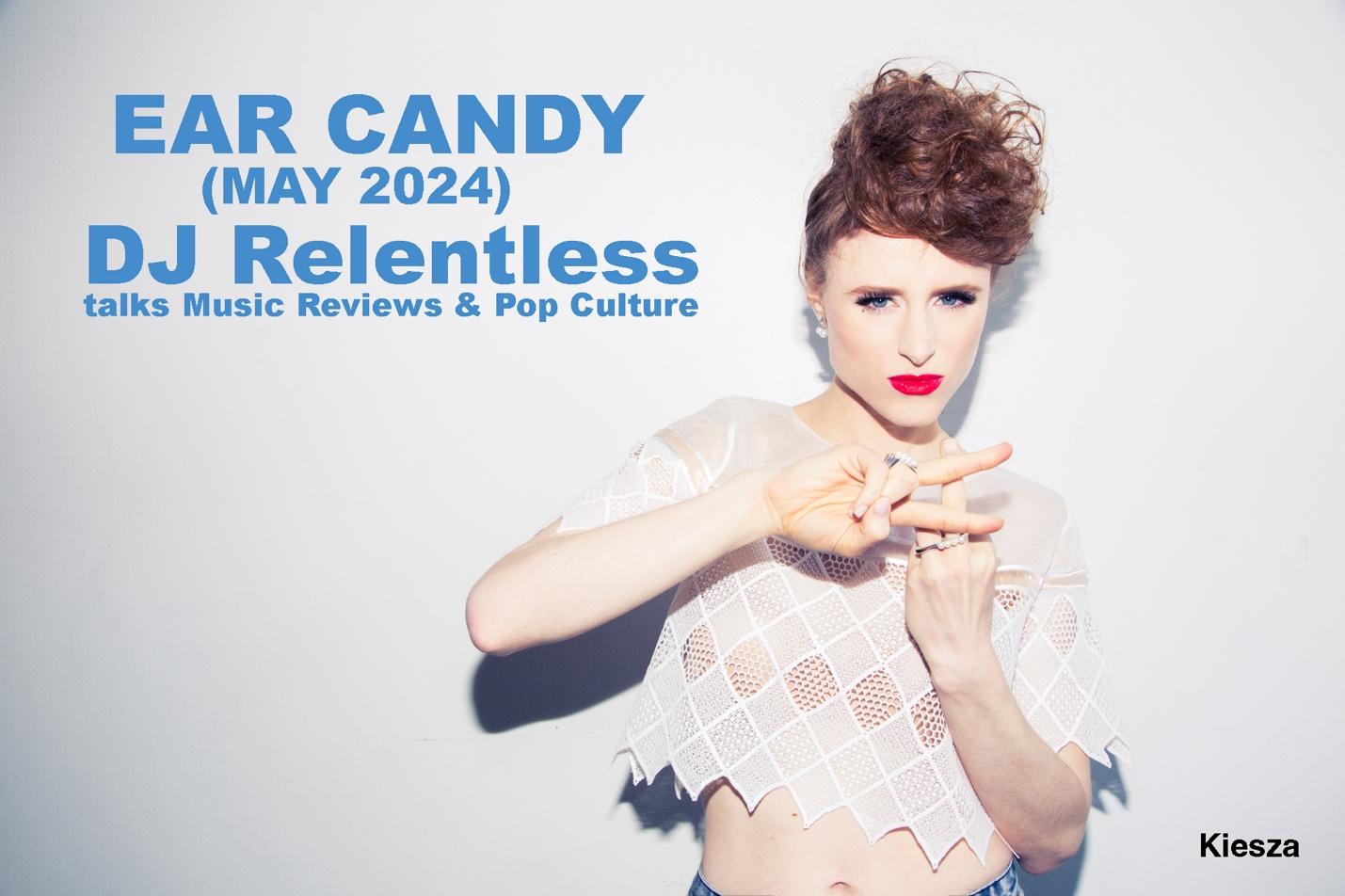
Listen to the mix here: https://www.mixcloud.com/djrelentlessny/ear-candy-may-2024
Download your free video of this mix here:
https://mega.nz/file/1jkTWCrL#pAYzxHHdjK1B7o3Cz5WHjGoFgyRc-krxLRWhpcyweKg
Check out DJ Relentless’ Mixcloud page: https://www.mixcloud.com/djrelentlessny
Check out DJ Relentless’ HearThis page: https://hearthis.at/djrelentlesstoronto
We are sliding into late spring and have so much music with so little time to get to all of it. So, I have chosen twenty tracks to look at and examine. And because Pop Music is everchanging, our focus is going to be the shift towards Country music and what that means for the Billboard charts over the summer. But don’t worry…I still included some LGBT artists as well.
So, let’s get started…shall we?
Our first song is an historic duet between LGBT artist, Orville Peck and the legendary Willie Nelson. It’s an old Country classic (that hasn’t gotten enough attention in my opinion) called “Cowboys Are Frequently Secretly Fond Of Each Other”. Originally recorded in 1981 by Latin Country musician Ned Sublette it has been the “gay cowboy song”. I had heard it a long time ago, but this new rendition strikes a chord against homophobia and stereotypes of gay men since Orville is an openly gay artist. I applaud Willie for standing up with us as we continue the fight for equality. There aren’t any
remixes yet, but I am hopeful. With all eyes on the Country prize, I’m sure some DJ/Producer is gonna do something with it before June for Pride!
And speaking of legendary Country artists…Dolly Parton pulled a fast one on us when she did interviews back in February and was asked about possibly having Beyoncé cover her classic, “Jolene”. She gushed about how it would be wonderful to collaborate with Beyoncé and amazing if she would update her song. Knowing damn well that it had already been done and that she had recorded a duet with her for her new album. And because of all this interest in “Jolene” tons of remixes of Dolly’s version have been dropping. So, I chose the Boogie Hill Faders Remix to be our second selection.

And of course, I had to follow it with Beyoncé’s new rewrite that turns the song into a warning to the other woman…just like Dolly had teased about. As the nay-sayers continue to dismiss Mrs. Carter, she continues to climb the Pop and Country charts. This album is a re-education of what Country music is and like McDonald’s “I’m lovin’ it”!
With Pride Month coming up, I started looking at LGBT Artists who have been remixed but didn’t get the recognition or fanfare that they should have. Melissa Etheridge has been an out proud lesbian since the 90s. And you don’t really hear any of her stuff on the radio and definitely not in bars. But the John J.C. Carr Remix of “As Cool As You Try” deserves another listen. I liked it so much that I edited a music video for this version to include in my sets this year.
So, I am assuming that in the next six months there are going to be a lot of Pop artists trying their hand at Country. For example, our next track is the Alliance Remix of “Space In My Heart” by Enrique Iglesias featuring Miranda Lambert. Why is a Pop Latin artist switching gears? My theory is that the division in politics and races in the U.S. has driven a wedge in popular music. Take a look at American Idol. How many Pop or R&B singers have won since 2010? The majority of winners have been Country singers. This was part of the Obama backlash. Black folks stopped really tuning in and voting after Obama got in office. This became the battleground for Pop music. Most of your Conservatives and Republicans are Country fans. They have been exercising their right vote every chance they get. And this is a big block of who is still listening to radio these days. And an artist like Enrique needs a hit to remain relevant. After seeing the response to Beyoncé’s album, many are going to migrate to what they think will be the trend. Kinda like what happened to Disco when folks like Ethel Merman killed the genre with her album.
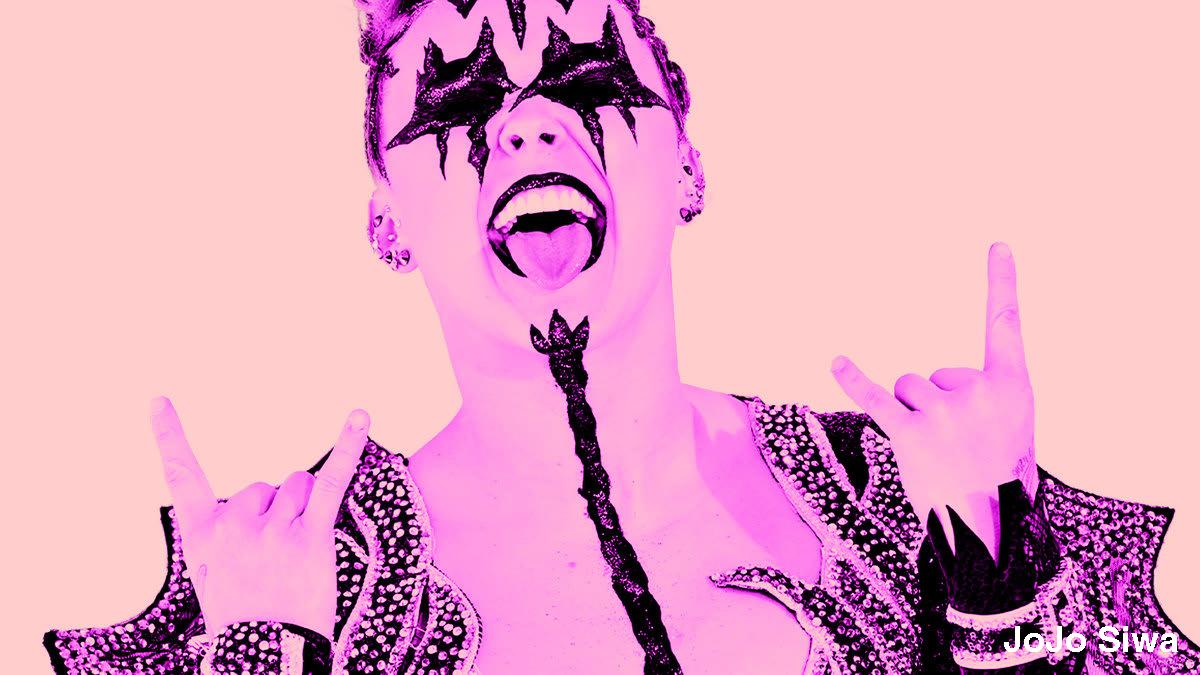
Okay after watching the docu-series “Quiet On The Set” my thoughts on child stars were confirmed. It is a fucked-up choice to put a child in the entertainment business. Yes, there are some who started young and still have their shit together, but the majority come out the other side really damaged. And our sixth artist in this month’s mix is proving to be a good example. JoJo Siwa went from a nine-year-old on Abby’s Ultimate Dance Competition to an out lesbian twenty-one-year-old whose getting a reputation of being a monster to work with. Some are defending her because she is an LGBT artist. Others are condemning her for her antics as a spoiled brat. You can’t just keep patting a child on the back and propping them up in a business that will chew them
up and spit them out. Yeah…the headlines keep JoJo’s name out there for now. But what happens when social media and the press turn on you? It’s gonna be another sad story of a person who was not prepared for the real world. But I digressed…
Ironically, JoJo’s new single is called “Karma”. Need I say more?

And speaking of karma…”No Angels” by Justin Timberlake is barely hanging on in the charts. If you go to YouTube and check, he only has 2.3 million views while Beyoncé’s “Texas Hold ‘Em” has 12 million. I didn’t care for his first release “Selfish” But I can say that “No Angels” is a return to the sound that I associate with Justin. It’s catchy and has a bounce to it but I believe the damage has been done from the Britney Spears fallout and he will never get back to the status he was twenty years ago. But this gave me an opportunity to highlight one of my friend’s remixes of his song. Brett Brisbois pumped this 112 BPM track into a Club friendly 126.
Our eighth selection is the B-Sensual Remix of “Lose Control” by Teddy Swims. Every since Post Malone hit it big, there’s been an influx of eclectic white guys with tattoos crawling up the charts. Jaten Collin Dimsdale doesn’t roll off the tongue as easy as Teddy Swims but his soulful mix of R&B, Country & Pop does. Talk about a crossover!
Now I have to admit that when I heard the name Jelly Roll, I giggled. I thought perhaps it was a name of a new dance. But I watched the Grammys and he won Best New Artist and I found da fuck out! Good for him! 39 years old and winning the New Artist…Wow! Although it was kinda shady that he also won the 2024 Grammy for Country Duo/Group Performance. I know he’s a larger size man but c’mon! Well, the Ligotti Remix of “Need A Favor” made me pay closer attention to this Country music favourite.
Okay…our tenth track is actually from three years ago but I think you will appreciate it when you hear the song after it. It’s “Ride On Time” by The Bamboos. This was an interesting Black Box cover. I kinda miss the Loleatta Holloway vocals being passed off as being sung by a skinny model. It’s not a bad cover…it’s just not the original. You could say that it’s no “Love Sensation”.

And our next selection was quite surprising for me. Blues Traveler has covered “Groove Is In The Heart”. It is miles away from Lady Miss Kier’s vocals and Q-Tip’s rap but as they say in the south…”Bless their hearts”.
How many of you remember the Canadian Club hit, “Hideaway”? We almost lost Canadian singer Kiesza in a car accident where she sustained an extreme brain injury back in 2017. So, I am so happy that she is still with us and has a new album out with
several singles dropping all at once. I chose “I Go Dance” to compliment the next track in our mix.

Consistently since the 90s Crystal Waters has been pumpin’ out tracks. Some have been hits and others have gone unnoticed. Her latest single is “Dance Dance Dance” and is a return to her happy House roots of the 90s like “Makin’ Happy” (which was one of my favs back in the day). So, I like this new one and I’ve heard a few of the remixes. I’ll be including this one in my sets for my Pride gigs. I hope that this one does well for her.
I was so happy to see Lenny Kravitz get his star on the Hollywood Walk of Fame. I have respected his choices and appreciate that he has walked the line between Pop and Rock his entire career. We cain’t all be rappers or a Luther Vandross. It is good to see an artist who does what he does best and stays true to his vision. And I’m lovin’ his latest single “Human”. It’s got a kind of Funk Rock feel and I could hear a remix or two coming out of it.
When I saw the title and artist of our fifteenth selection, I cringed. The name Cascada (for me) always makes me think of bad Hi NRG Dance tracks that I would never play. I’m not a fan of her work at all. So, when I saw she had done a cover of the Marvin Gaye & Tammy Terrell Motown hit “Ain’t No Mountain High Enough” I got a little sick. Has she butchered a classic? Well to my surprise, she actually did a good job with it. Get her the right remix I could see this being a hit for her.
The rise of Latino artists in Pop music has been great. The United States is definitely the melting pot. And Latin Culture has been very important to this country. And without
people of colour North America would not have been built and harvested. So, to see an artist like Karol G get honoured at The Grammys brings joy to my heart because I know how hard she has worked. I don’t speak spanish but when I heard Karol’s latest collaboration with Tiësto, “Contigo” I kept thinking that I had heard this melody before. And I was right. It’s a spanish interpolation of “Bleeding In Love” by Leona Lewis. And from the video, I gather Karol is a member of the LGBT Community. Just another reason to love and support her.

And it seems if the Pop artist is not switching to Country, they are gravitating towards Latin music. And about six years ago, Jason Derulo was all over the Pop charts. He had several bangaz that I definitely played in my sets. But after his role in the movie version of “Cats” his popularity started to fade. And he hasn’t really had a big hit since. So, he has tried several collaborations, and none so far have done that well. So, when I saw him on Jimmy Kimmel Live performing “Spicy Margarita” with Michael Bublé I kinda shook my head. It’s a nice catchy tune with the music of “Sway”. Will it be his comeback hit? Probably not. We’ve got a hot summer of women who will be dominating the charts.
Our eighteenth track is the Jpan Remix of “Rich Baby Daddy” by Drake featuring Sexy Redd & SZA. In Canada, Drake is one of those international recording artist that is respected and loved. But in the world of Hip Hop you might make a big splash with a
few hits but eventually the others in the pack will come for you. And at the moment, Drake is hated by a few male rappers like Kendrick Lamar, J Cole & Pusha T. All of them have been coming at Aubrey pretty hard. And while he keeps throwing diss tracks right back, the truth of the matter is the heart and soul of Hip Hop comes from the struggle. Even Eminem had a real struggle in his life that rang authenticity to the listener. In my opinion, there’s only so many raps you can listen to about flossing, big booty hoes and niggas tryin’ to kill ya before you manifest these things into reality. So, at this point I don’t wanna hear anything from Drake until he has something else to say.

Ever since I found out that Shakira was implicated in the Pandora Papers scandal where she allegedly used bank accounts in the British Virgin Islands to avoid paying taxes, what little respect I had for her went out the window. For me, she hasn’t evolved as an artist or frankly as a person. If I gotta pay taxes in Canada and the U.S. I am not amused at all with those who try to cheat. And after her comments on the “Barbie” movie, I’m like “Gurl, have several seats”. You’ve been doing the same “Hips Don’t Lie” choreography for decades. So, while I do like Cardi B’s verses on your new single “Punteria” and the Electrotton Remix is nice, I’ll only play this song if someone requests it.
And to close out our mix is the Cunty Ballroom track “Banjee Girls” by Kanye The Lovechild. I guess since Kanye no longer uses that name it was up for grabs. And I’m sure he is probably not happy about this uber Gay Ballroom child popping up when you Google “Kanye”. But I’m lovin’ this track! We need more Bitch Tracks and Cunty Beats on the dancefloor. And the video is quite cute with a cameo by the legendary Kevin Aviance.
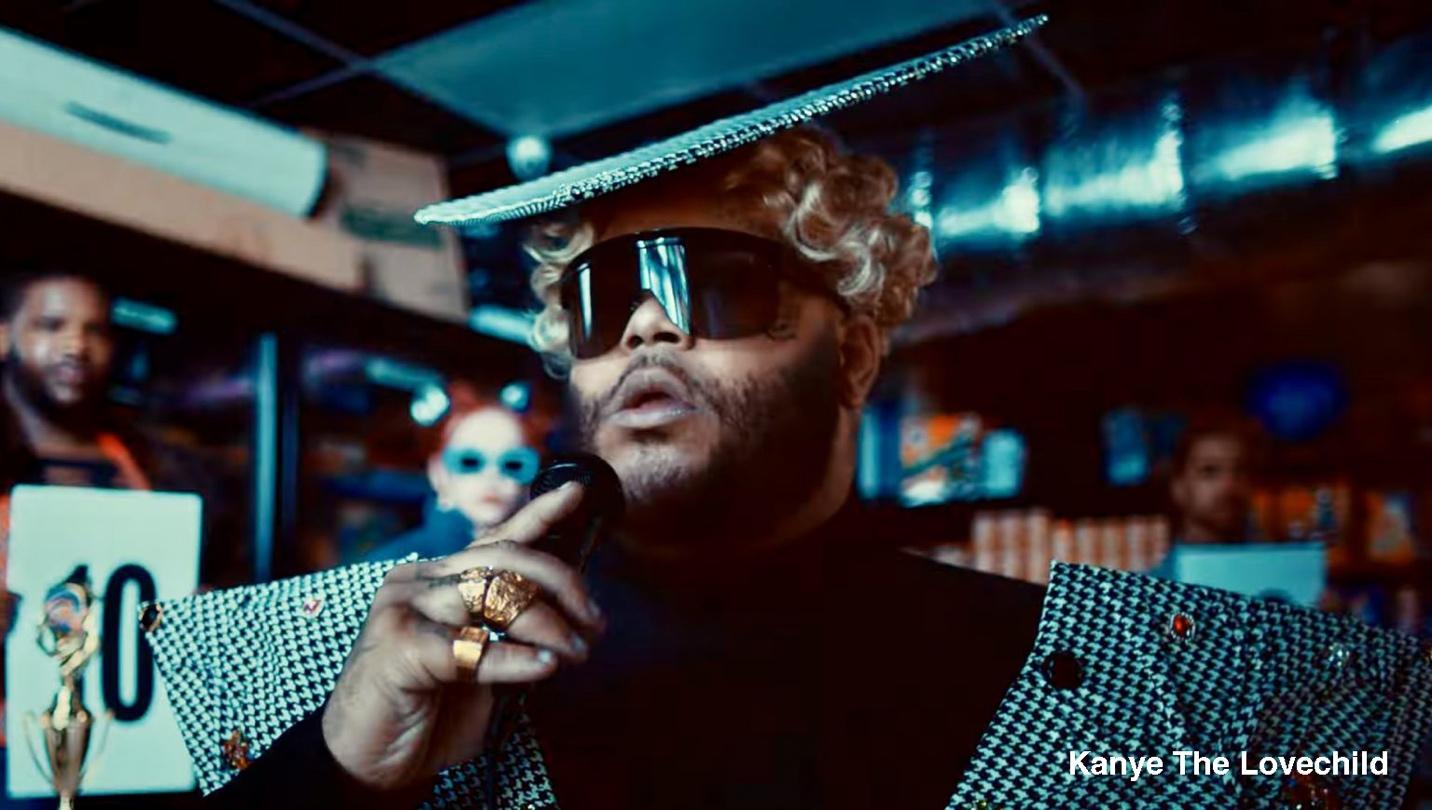
Don’t forget to download your FREE copy of the video mix with the link at the beginning of this article. Until next month, check out my Mixcloud & HearThis pages for music.

Think about the legacy you will leave behind.
